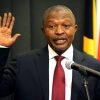Why under valuing families is a problem for South Africa’s economy
By: Linda M. Richter, University of the Witwatersrand

Shutterstock
Linda M. Richter, University of the Witwatersrand
A country’s wealth goes hand in hand with its Gross Domestic Product (GDP), which is the market value of goods and services over a defined period of time. In contrast, wealth is capital or assets: the tools we have to create GDP sustainably.
There are several types of capital available to a country: manufactured capital, natural capital, financial capital, social capital and human capital. Human capital includes people’s health, education, skills, motivation and inclusion. Social capital, on the other hand, refers to institutions and organisations that help to develop human capital: families, communities, businesses, schools, faith organisations, and the like.
A recent World Bank analysis concluded that two thirds of the wealth differentials between countries can be attributed to variations in human capital. It found that human capital accounts for 70% of wealth in high-income countries, whereas natural capital remains the biggest asset in low income countries.
Importantly, low-income countries that have moved to middle-income status have done so mainly by investing in human capital, particularly, health, education and infrastructure.
Human capital depends on social capital. Young children are born healthy, grow well, learn, get on with other people, work productively and pass on their resources to their children when government and families collaborate to create social capital.
Schools, health services, neighbourhoods and other social institutions in which we live work best when the state provides a facilitating environment and high quality services – and recognises this is only half of what is needed to realise and maintain its people’s potential.
The other half comes from the sacrifices made in families to give children the best possible chances, love, encouragement, support and help children receive from teachers and peers, and higher ideals and motivation inspired by leaders.
While overwhelming numbers of South Africans know that they owe almost everything to their families, families are massively under-valued in the country’s economy. This is what is argued in the 2018 Child Gauge, an annual publication which explores how the country’s children are faring. The state and families both have to step up to improve South Africa’s human and social capital.
Human capital is built from the start
Human capital development starts young. In the first three years of life, the brain is a sponge that soaks up experiences. These experiences mould who we become, including our vulnerability to illness, our confidence to learn, our ability to relate to others and our determination to push on even when things are hard.
Long term studies show that a poor start in life translates into an average loss of adult income per year of 26%. At a country level this exerts a downward pull on GDP, wealth as well as the country’s future growth.
The effects of poor early childhood development are expressed throughout life and into the next generation: poorer physical growth and health, less learning and schooling, lower prospects of work, poorer wages and increased social risks. Children born into these conditions start with lead on their feet.
Among the findings in the 2018 edition of the South African Child Gauge is the fact that more than 60% of children live in poverty. This means most children in South Africa live in households where the income is less than R1 138 per person per month. 12% of children live in households where they go hungry and more than a quarter of children younger than 5 years old show stunted physical growth. Poor conditions for children’s development, coupled with poor quality schooling, mean that fewer than half of young people end up obtaining a school-leaving matric certificate.
What can be done?
For its part, government must recognise that it cannot develop human potential –- a country’s most significant source of wealth –- on its own. Families and communities have a strong role to play. But to do this, families have to be enabled, supported and appreciated. Most critically, families must be provided with quality services that match their investment in their children.
Families must recognise that the state cannot develop their children’s potential on its own. Even the best schools and health services will not make or keep their children healthy, educated and well-adjusted without their families’ deep commitment and engagement.
Families and the state are equal partners in ensuring that the most critical element of our wealth and our future –- human capital – is nurtured and fostered from young, and throughout life. In this way, human wealth can be shared by us all and handed on to South Africa’s children – with interest.![]()
Linda M. Richter, Director, DST-NRF Centre of Excellence in Human Development, University of the Witwatersrand
This article is republished from The Conversation under a Creative Commons license. Read the original article.
Written by: Natasha
Similar posts
MORE ARTICLES

‘How are you 48?’ – Loyiso Bala showers wife Jennifer with birthday love

Former deputy president David Mabuza dies aged 64

WATCH: Sello Maake KaNcube on the stage play ‘Master Herold and the boys’ & the joys of his acting career

Kenyan Supreme Court grants inheritance rights to children born out of wedlock

WATCH: Castrol FastScan Mechanics Meet ups | Randburg
QUICK LINKS
UpComing Shows

959 Music Weekdays
Kaya 959 Hits
Real. Familiar. Memorable. Kaya 959 brings you the music you know and love from our playlist. Uninterrupted. Thursdays 20h00 to 21h00
close
The Best T in the City
With T Bose
He has held it down in the world of mid-morning radio with the best music, riveting topics, brilliant mixes and interesting guests. Every weekday, The Best T proves why he is the BEST by connecting to you like only your bro or favourite uncle could. He lets his listeners dictate the songs they want to hear in the ever-popular Top 10 at 10, and his Three Teaspoons never run out. Catch The Best T in the City Mondays to Fridays from 09h00 to 12h00.
close
Feel Good
With Andy Maqondwana
Feel good about feeling good! That's exactly what The Feel-Good show is about. An escape from the negativity that surrounds us, indulging you in good feels. Pass it on to one and all. Spread the good feeling around Gauteng with Andy Maqondwana.
close
The Hive
With Bonolo "Bee Sting" Molosiwa
Every "Hive" needs a Queen B and Bonolo "Bee Sting" Molosiwa is Kaya 959's honey who brings in the money. With her bubbly personality, infectious laugh, Bee Sting radiates positive energy which is all you need to get your weekend off to the best start. Don't miss the Afrobeat Dancehall Ragga (ADR) Top 10 on The Hive with Bee Sting every Saturday from 18h00 - 21h00.
closeConnect with Kaya 959
DownLoad Our Mobile App
© 2025 Kaya 959 | On The Street On The Air










